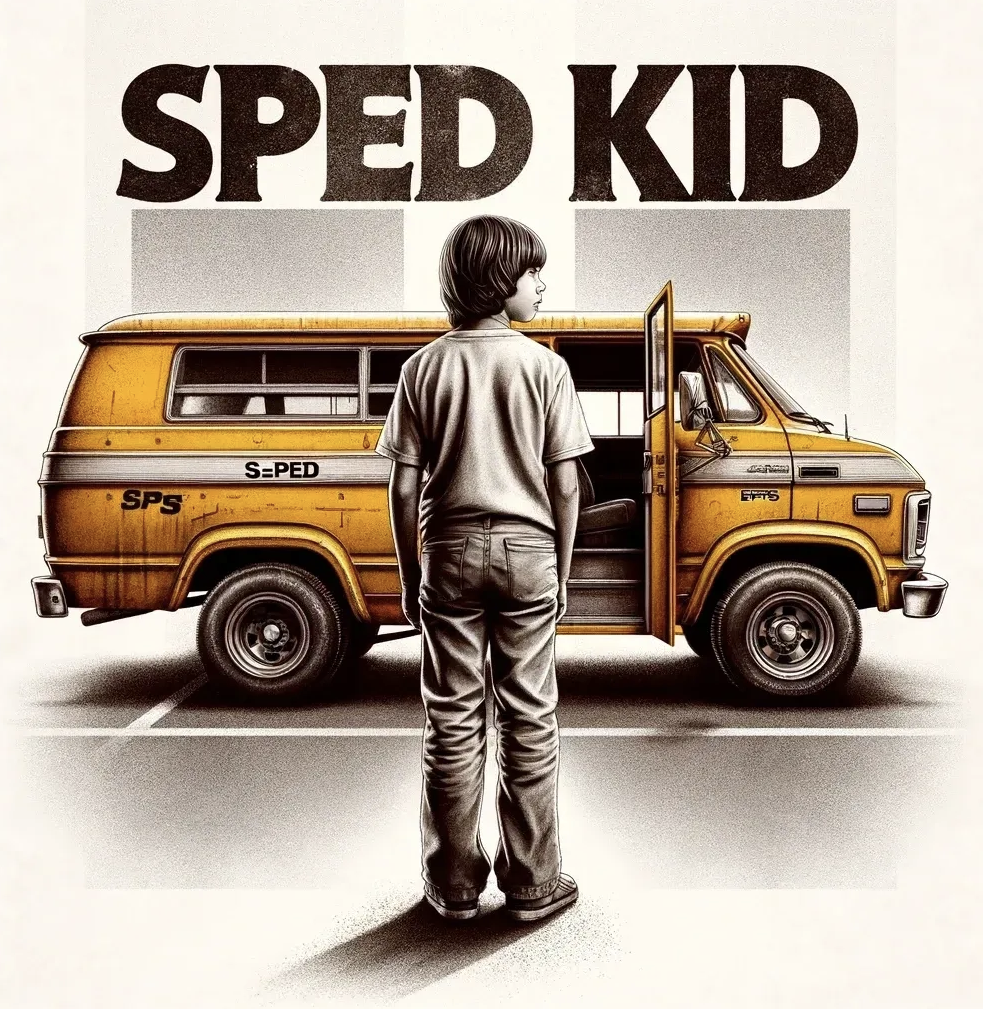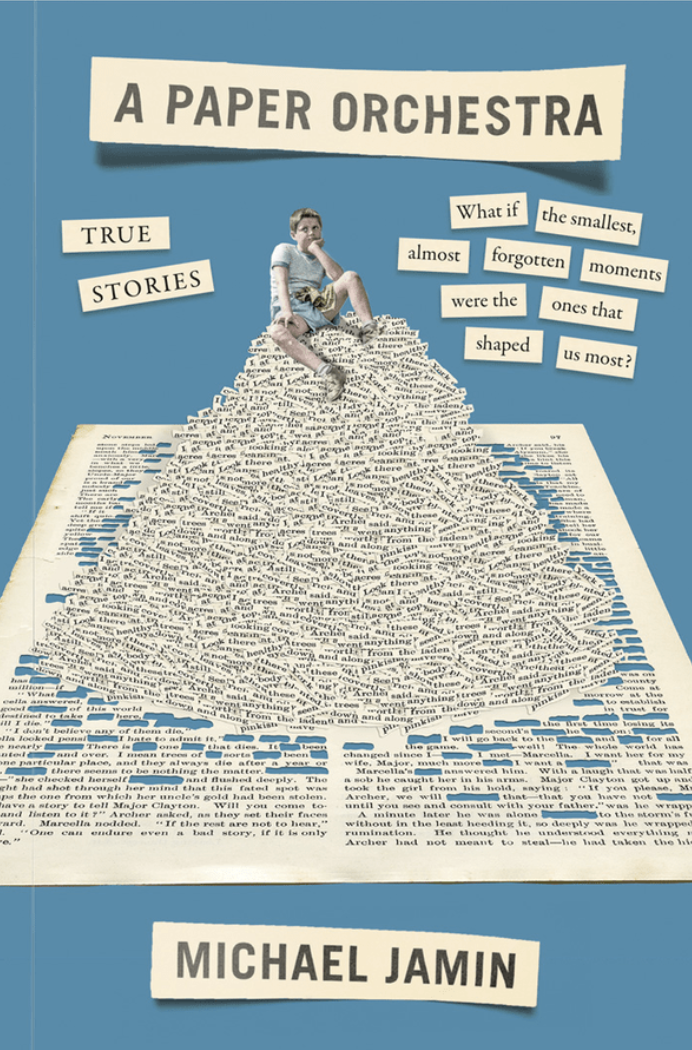Male Vulnerability Done Right
Next up: two reviews of shows by men who were truly vulnerable.
I’m just going to say it - a lot of solo shows by men that get praised for their "vulnerability" leave me shaking my head. Because if a woman said the same thing, no one would care.
Why? Because the bar for male vulnerability is still astonishingly low. Stuff that two women might casually share while getting their hair done somehow becomes “brave” or “profound” when a man says it on stage.
Honestly, I’m tired of men getting praise for saying the absolute bare minimum.
And that tells us a lot about the unconscious biases of the people who write reviews and hand out awards.
The two shows I’m sharing here are not that. At least, I don’t think so. They go deeper than the kind of thing you'd overhear in line at Trader Joe’s.
The first, Sped Kid, is about a boy losing his eyesight in 1980s Boston. It’s just as much an autobiography as it is a portrait of the city at that time. The other, A Paper Orchestra, is two autobiographical essays focusing on masculinity and parenting, one from the writer’s childhood and the other from his experience as a father.
Thanks for reading.
(Note: These reviews were originally published as part of my 2025 Edinburgh Fringe coverage for FringeReview. I’m archiving them here for readers who don’t follow that site.)
Sped Kid
TL;DR
Sped Kid traces a boy’s gradual blindness alongside the racial tensions, police brutality, and gun violence of Boston in the 1980s. The performer tells his story only through his own voice in conversation with others, keeping the piece taut and intimate. The result is both a moving memoir of disability and an unspoken metaphor for a society that refuses to see those most at risk.
Review
Sped Kid is a deeply personal and sharply drawn solo show about growing up in 1980s Boston while gradually losing vision. The writer/performer Adam Linn, now legally blind, retraces the moments of boyhood when he first sensed something was wrong, but the adults couldn’t fully see it.
The piece unfolds entirely in Linn’s own voice, but always in dialogue: with his single mother over burgers, with a German eye doctor fumbling the diagnosis, with friends, teachers, and his grandmother. He never slips into caricature or “playing” other people; instead, we infer their responses through his words. That choice keeps the storytelling taut and intimate: we’re always inside his perspective, even when the world around him seems not to see him clearly.
The show is not only the story of one boy’s vision loss. It is also a portrait of Boston in the 1980s, where racism, police brutality, and gun violence were daily realities. These social textures run alongside his own journey, shaping the environment in which his disability came into focus. And there is an unspoken metaphor here: as Linn’s sight fades, the wider world is shown to be willfully blind to injustice. His struggle to be heard and understood mirrors a larger cultural refusal to see the people most at risk.
Eventually, he ends up on the SPED bus, the special education bus, with all the stigma and resilience that came with it. Through this lens, what could have been simply a memoir of disability becomes a broader indictment of systems that fail to notice, listen, or care.
What makes the piece compelling is its clarity of voice. Linn never overreaches for sentimentality or stage gimmicks; instead, he trusts the audience to follow him through the unfolding realization of blindness, and through the community stories braided into it. It’s an honest, specific, and unvarnished coming-of-age narrative that leaves you with the sense of having not only met the boy he was, but also the city he came from.
Sped Kid is an Excellent Show- grounded, distinct, and resonant. It deserves to be widely seen.
A Paper Orchestra
TL;DR
In A Paper Orchestra, veteran TV writer Michael Jamin trades sitcom punchlines for prose, performing two essays from his collection with depth and a rare level of honesty. The result sits somewhere between a live reading and a solo play: stripped-back staging, vivid imagery, and reflections on childhood, parenting, and self-knowledge. It offers a quietly rewarding hour with a seasoned storyteller.
Review
Michael Jamin has spent nearly three decades as a Hollywood TV writer, shaping the voices of animated icons and sitcom characters for Beavis and Butthead, King of the Hill, Just Shoot Me, and Maron. But as he admits early on in A Paper Orchestra, those years left him with a blind spot: he knew his characters inside and out, but he didn’t really know himself. This show, drawn from his essay collection of the same name, is his attempt to close that gap. As someone who grew up watching Beavis and Butthead, I was pleasantly surprised to discover that’s a wide gap.
What he offers at the Fringe is prose-meets-stage, a piece that lives comfortably between The Edinburgh Fringe and The Edinburgh International Book Festival. While most solo shows at the Fringe are written for the stage, tuned for theatrical beats and audience interaction, Jamin, by contrast, has taken prose essays and memorized them verbatim. The result is more like a memorized live reading performed with a writer’s cadence than a conventional solo play. There’s no set beyond a stool in a black box theatre. No props, no projections. Just a few sound and lighting cues. The result is that the work lives entirely in the imagery of his writing and the precision of his delivery.
That simplicity turns out to be one of the show’s strengths. Jamin trusts the audience’s imagination to build scenes, which include a childhood backyard, a judo gym, and a neighbour's dilapidated home. He sketches just enough detail to anchor us, but never over-paints. The restraint allows listeners to co-create the world with him, and it feels like a nod to Scotland’s long tradition of oral storytelling: one voice in a room, conjuring something much larger than itself.
Themes of intimidation and judgment run strong- how we shrink from things that scare us, and how easily we judge others and make assumptions about what’s best for them, especially in close relationships. In the first essay, Jamin reflects on childhood vulnerability and the pressures of masculinity; in the second, on how those same dynamics can resurface in adulthood, especially in parenting. He circles questions of when to push, when to protect, and what it means to truly see another person for who they are. He doesn’t offer answers. Instead, he leaves the dilemmas suspended in the air, letting the audience feel the tension between love, fear, and control.
As a performer, Jamin is not a polished actor. He is a writer inhabiting his own text, and the moments when he lets his body fully register the fear or shame of a memory, the prose sharpens into theatre. There’s a fight sequence where his physicality suddenly tightens, his voice speeds, his posture curls; in that instant, you no longer feel like you’re hearing a story, you feel like you’re in it. Later, when he shifts to adult life, the weight is quieter, but no less affecting.
If Jamin were to return to the Fringe with different essays from his collection, there’s room to experiment with how prose works on stage. He could adapt the text more fully into a solo play, trimming the “he saids” and “she saids,” or descriptive tags that performance alone can convey, so that the piece leans into theatre’s power to “show” rather than “tell.” Or he could go in the opposite direction, leaning even further into the literary quality by making the presence of manuscript pages and the book itself part of the staging. Imagine pages being handled, shifted, or even scattered, a literal “paper orchestra” that deepens the live-reading effect. In the performance I saw, a single sheet drifted from the ceiling onto the stage, likely by accident, but it almost looked like confetti and felt like it belonged to the piece. Still, there’s something admirable about Jamin’s choice to let the words stand exactly as written, trusting that the storytelling itself is strong enough to carry.
What makes A Paper Orchestra rewarding is its depth. These are not sketches or anecdotes written to score quick laughs or applause breaks. They are essays of substance, layered with reflection on masculinity, parenting, vulnerability, and intimacy. They show a writer at midlife turning the gaze inward with honesty, and in a festival where so much work skims the surface, the richness feels like a gift.
For that reason, A Paper Orchestra earns the label of Recommended. It’s not yet a fully realized piece of stagecraft (being more literary reading than solo play) but the writing itself is excellent: rich, reflective, and rewarding. Audiences who lean in will find themselves in the hands of a seasoned storyteller willing to sit with life’s messier questions. That honesty makes this show a quietly distinctive contribution to the Fringe.








